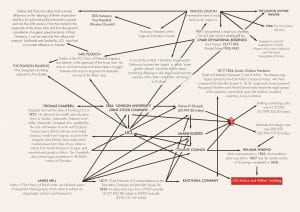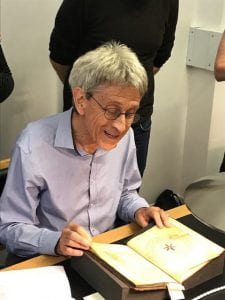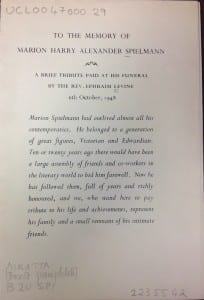As signalled in Ben’s Liblist message of 11th June 2020 we wanted to share a bit more detail about the work that has already happened in the area of ‘decolonising our collections’ and plans to develop and build on this work. There is a lot of activity in this area across the library and archives sector, many colleagues have attended events nationally related to this topic and there is a high level of interest and commitment to this area of work across the service.
Back in November 2019 a meeting was convened for all academic support staff interested or already engaged in themes around “decolonising” collections, at subject or site level, to consider the scope for activities in Library Services. The response was huge. We considered terminology and agreed we’d give this work the title of ‘Liberating the Collections’ so that it would complement the existing ‘Liberating the Curriculum’ work that UCL has undertaken. We also felt that the unintentional mis-use or misappropriation of the terms ‘decolonising’ or ‘decolonisation’ could be problematic.
Colleagues shared examples of work already being undertaken including:
Reclassification – recent projects

Art Reading Room, UCL Main Library (photo courtesy of Liz Lawes)
Tom Meehan (Head of Cataloguing & Metadata) spoke about a project initiated by Liz Lawes (Subject Liaison Librarian: Fine Art, History of Art, Film Studies, Small Press Collections) for the MX section of the ART collection, to change the classification of non-Western art from purely alphabetical-by-country to a logical arrangement using Garside’s standard geographical table. This followed on from a student enquiry and meant that African art in particular could be more effectively organised and less marginalised. The project involved mapping the former classmarks for 2000 items to new ones (in this case also recalculating Cutter numbers), making the changes to Alma holdings records, and physically relabelling and moving the books.
Wojciech Janik (Area Liaison Coordinator & Area Liaison Librarian for Russia, Ukraine, Belarus & Eurasia) shared details of similar reclassification work at SSEES library, undertaken to create new categories for materials from former Soviet republics which have been independent countries for almost 20 years. These had continued to be classified within the Russian collection which is politically problematic. There was a lot of interest in this work and it even resulted in a donation of books from the Georgian Ambassador.
Reading lists – modelling good practice
With planning for the new UCL East campus under way there is an objective to embed good ‘Liberating the Curriculum’ practice in new programmes from the outset. Hazel Ingrey (Head of Teaching & Learning Services) is working with academics to suggest inclusive, non-canon literature and viewpoints for the new reading lists that they will curate.
Change the Subject! – film screening at UCL
On 3 February 2020, Library Services co-sponsored the London premiere of this documentary, with UCL’s Department of Information Studies (DIS). The film narrates the story of a group of students at Dartmouth College in New Hampshire, USA, who challenged anti-immigrant sentiment as represented by the Library of Congress subject headings in the Library catalogue, and specifically the term ‘illegal alien’, used by academic libraries globally.
Open to attendees across the library sector, the screening was followed by a panel discussion where UCL was represented by Tom Meehan. The film is temporarily available to view https://www.pbs.org/video/change-the-subject-23nbpj/
Steps to Progress – facilitating and hosting a student initiative

Steps to Progress, UCL Main Library
In late 2018 a PhD student from UCL’s English Department approached the Library with a project he was developing, with the support of the Vice Provost International and other senior officers, to install decals of book spines to the stair risers leading to the Main Library that challenged existing perceptions of the literary canon and celebrated the diversity of the UCL community. Supported and enabled in liaison with library colleagues, the project came to fruition in early June 2019 https://blogs.ucl.ac.uk/libnet/2019/06/05/steps-to-progress-2/. It has received considerable attention and plaudits from both UCL and external visitors to the space.
Eugenics Inquiry – supported and informed by Library Services
In 2018, UCL’s President & Provost Professor Michael Arthur commissioned an ‘Inquiry into the History of Eugenics at UCL’, led by Professor Iyiola Solanke of the University of Leeds. Library Services supported the Inquiry through the Director of Operations acting as secretary, and Special Collections staff assisting with identification and provision of evidence drawn from the archives and records materials we hold. Learning and insight from this process has been shared with Library Services staff in the Peer Review https://www.ucl.ac.uk/libnet/news-social/peer-review/archive-2020/issue-168-02-march-2020 on 2 March 2020. The articles illustrate some of the discoveries made and implications for how our collections might be researched and presented in future.
Sustaining the Liberated Curriculum – Special Collections project
The Special Collections team have long been involved in Liberating the Curriculum work, the most recent example being a funded project to develop enhanced resources for archival handling and exploration to support teaching in the BA (Hons) Education Studies at the IOE. The focus of the project was the preservation and digitisation of historical materials used for teaching about groups whose experiences have often been marginalised in historical accounts of education – in this case girls and the science curriculum, multicultural and anti-racist education in the 1970s and 80s and disability and special educational needs (SEN). Although they can be accessed in person, the resources are now available to UCL students on Moodle and have been used to develop teaching and student research in these areas over the past 2 years.
Next steps: Liberating the Collections Steering Group
It was agreed that there is a lot more that we can do and that we needed to establish a group to plan and oversee strands of activity across Library Services, aligned to our Strategy, UCL’s Liberating the Curriculum initiative and with reference to best practice in the library sector.
The group will be meeting for the first time on the 15th July to agree terms of reference and decide the priorities for this work going forward. The group will report to the Collection Management Advisory Group (CMAG) and connect closely with the Library’s Equality, Diversity & Inclusion Committee.
It will be co-chaired by Rozz Evans (Head of Collection Strategy) and Kate Cheney (Head of Site Library Services and lead for the Staff Equality, Diversity and Inclusion Key Performance Area).
 Close
Close












